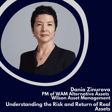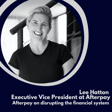Introduction and Purpose of Podcast
00:00:03
Speaker
Welcome back to the Alpha Females and Best Podcast, two females working in the finance industry searching for alpha. My name is Clooney. And my name is Emily. And together we bring diversified perspectives from the buy and sell side of the finance world.
00:00:18
Speaker
As usual, of course, any information discussed in this podcast is not financial advice. All opinions do reflect those of the individuals, and you should always read the PDS and talk to a financial advisor who can consider your personal circumstances before you make an investment. This podcast is also intended for educational purposes only.
Cryptocurrency Insights with Lachlan Feeney
00:00:38
Speaker
So one episode we have been keen to do from the start was on the role of cryptocurrency and blockchain on the financial system, both from an investment opportunity perspective, but also how it is going to play a role in our lives going forward. So we've chosen another business founder for this episode, Lachlan Feeney, who is the founder and CEO of Labrys, Australia's leading blockchain development and consultancy agency.
00:01:04
Speaker
Lachlan was an early adopter of Bitcoin and quickly understood the immense impact that it and blockchain technology would have on our world. He founded Labras at the age of 19 after dropping out of his IT degree to play a key role in the growth of the blockchain industry. Since Labras has rolled out blockchain solutions for international governments,
00:01:24
Speaker
enterprise, including ASX listed down at EDI, and major crypto protocols with hundreds of millions of dollars worth of assets secured by these solutions. Lachlan, welcome to the show. Thanks for having me. Super excited for this episode. As I mentioned at the beginning, it's definitely one we've had on our to-do list for ages. I'm so excited that
00:01:47
Speaker
It seems like we've found the perfect person to run the episode with. As we sort of prepped you just at the beginning, we do like to start the episode with the same question every time. Could you please tell us what's been your most embarrassing career moment?
00:02:05
Speaker
I have to give you a blockchain-based one considering that's the topic of the discussion today. For me, the thing that probably haunts me the most is coming back to Bitcoins and Ether and other crypto that I've sold years ago and looking back on the price appreciation since those were originally sold.
00:02:30
Speaker
I was into the crypto space, particularly Bitcoin and Ethereum since very, very early days. I did a lot of messing around back in 2014, 2015, 2016. I sold a ton of crypto that if I hadn't have sold, I probably wouldn't be here today. What price did you sell at?
00:02:53
Speaker
I sold a ton of Ethereum below $10, which is now trading at almost $5,000. We live when we learn, and it's still been a super cool journey, and I'm glad to be a part of the space.
00:03:13
Speaker
Yeah, good one. I mean, we all make those mistakes, right? But like you said, you live and you learn. So that is something that we all are familiar with selling too early. So I can definitely relate there.
Understanding Blockchain and Cryptocurrency
00:03:24
Speaker
I guess there's a huge amount of exciting innovation going on and the concept of decentralized finance. So can you explain what that means and how we can relate to it?
00:03:35
Speaker
Yes, decentralized finance or what we call DeFi in the blockchain space is one of the most exciting innovations happening at the moment, in my opinion, not just in blockchain, but just general exciting innovations that I think is going to completely change the way that we do business and particularly the way the finance world works.
00:04:02
Speaker
Most people are familiar with Bitcoin, the idea behind Bitcoin, money on the internet, e-money, this sort of thing, democratize access to money no matter where you are, what country you're in. You get the right to sound money that isn't being inflated away. The whole point behind DeFi is basically giving the core foundations of the financial world
00:04:27
Speaker
and giving access to basically everyone to access those core services. So we're talking about borrowing and lending, getting loans, trading, spot trading, futures trading, lending trading, leverage trading, all of the sort of like core plumbing of the current financial world that has been built and sort of put together on
00:04:55
Speaker
monolithic IT systems over decades is entirely getting rebuilt from scratch at the moment. It's going to be hyper-efficient. Everyone's going to have access to it. It's going to be way better, way faster, way cheaper than anything that currently exists today.
00:05:19
Speaker
You clearly know a hell of a lot more about this than I do. I'm sitting here sort of taking notes on some key words there. So we might start simple, but can I just ask, what is the difference between blockchain and cryptocurrency? Both words are thrown around all the time. And I feel like some investors potentially get a little bit confused between the two.
00:05:42
Speaker
Yeah, so that's a really good question. Essentially, blockchain is the underlying system or infrastructure that underpins these decentralized networks. So Bitcoin was the first implementation of a blockchain. And I think where the confusion sort of comes from is Bitcoin
00:06:08
Speaker
is a cryptocurrency, and it was the only thing that you could do on the Bitcoin blockchain. People used blockchain and cryptocurrency interchangeably because on Bitcoin, the only thing you could do on that blockchain was a singular cryptocurrency.
00:06:27
Speaker
The blockchain is basically the infrastructure. The cryptocurrency is like a digital coin or digital currency that trades on top of it. When we have new blockchains, blockchains like Ethereum and all of the other platforms that are out there,
00:06:44
Speaker
Now, all of a sudden, you can have multiple cryptocurrencies. You can have decentralized applications or dApps and all of these different things. But to break it down as simple as possible, blockchain is the infrastructure that underpins it, the consensus mechanism that allows us all to agree on what's true on the network.
00:07:05
Speaker
And a cryptocurrency is just a use case of a blockchain, in this case, a digital money, essentially.
00:07:14
Speaker
That's a really good breakdown. And you mentioned Bitcoin, which does tend to be the dominant crypto, but then you also kind of raise the idea of Ethereum. I guess there's also thousands of other cryptocurrencies out there, and we probably hear about only a fraction of them. So why do some become popular and others become still unheard of even after years?
00:07:38
Speaker
Yeah, so there are thousands of cryptos out there across all of the different blockchain systems. I think if you go into like coin market cap or there's different sites that like ranks them, you maybe get like 10,000. If you go into a block explorer, I think there's like almost half a million different tokens and cryptocurrencies that just exist
Cryptocurrency Popularity and Myths
00:08:04
Speaker
on the Ethereum blockchain, let alone all of the others.
00:08:08
Speaker
Most of these, they're nothing. They're garbage. They're vaporware, coins. Anyone can create them. You could go home tonight and create an alpha female's invest cryptocurrency. It doesn't mean it's valuable. Maybe we should do that. We should do that. Value add alpha generation.
00:08:31
Speaker
Yeah. So there's thousands out there. Anyone can create them, but the good ones have proper use cases. So that's why you always need to be sort of super careful. Although there's thousands out there, there's probably only, you know, a handful of what we'd call like blue chip cryptos. And then there's a bunch of like speculative cryptos. And then there's a bunch of just, you know, a thousand feet of garbage. Sort of sounds like the stock market to a degree.
00:09:00
Speaker
Yes, yes, it does. Lachlan, you just touched on some of the use cases. Is crypto a viable currency in your opinion, or is it still mostly used in the dark web? I guess for you, maybe that sounds silly, but I know that's still a common thought process. And I guess how do you determine the blue chip cryptos versus the more specky ones that you just mentioned? Yeah, I think
00:09:26
Speaker
Cryptocurrency definitely has the potential to be real world currency. And this whole notion that Bitcoin is used on the dark web or used for illicit purposes is completely misunderstanding Bitcoin and how it works and what people use it for, but it's a misconception that has stuck.
00:09:50
Speaker
So first of all, we're seeing the emergence of what we call CBDCs or central bank digital currencies. These are going to be cryptocurrencies run and issued by central banks around the world. And in my opinion, in 10 years from now, possibly sooner, maybe a little bit longer, but this is how money will work. Like we're already moving towards a cashless society.
00:10:18
Speaker
And cryptocurrencies, particularly cryptocurrencies issued by central banks, will just be the next evolution of that. I still think Bitcoin itself and a bunch of other cryptos will actually be used as currency as well. We've just seen it, Bitcoin being legalized as legal tender within El Salvador. There's a couple of other countries looking at that as well. On the dark web point,
00:10:43
Speaker
If you're using Bitcoin on the dark web, you probably have no idea what you're doing because Bitcoin is actually not anywhere near as anonymous as people think. It's an open public ledger where everyone can see what you're doing. It was used early on on dark web marketplaces, but people worked out very quickly that this is just a terrible use case for Bitcoin because
00:11:10
Speaker
It is so easy to track you and your Bitcoin transactions as soon as anyone works out which Bitcoin wallets you own. And finally, coming to the third point about Bluechips. Bluechips are really the core infrastructure platform. So Bitcoin has cemented itself as
00:11:32
Speaker
the gold of the blockchain world or the store of value currency, the immutable digital property of blockchain or the digital world. Bitcoin is definitely a blue chip. It's not going anywhere. Then you have Ethereum, which I'd also consider a blue chip. It has cemented itself as basically the blockchain infrastructure provider for decentralized applications, for DeFi, for NFTs.
00:12:02
Speaker
these sorts of things. There's a couple of other
00:12:06
Speaker
blockchain platform providers that, depending on who you ask, may be considered blue chip. These are generally competing with Ethereum platforms like Cardano, Polkadoc, Solana, these sorts of things. They're a little bit more speculative. And then when you move away from the infrastructure layer to the application layer to companies and
00:12:32
Speaker
startups that are basically building on these blockchains that have their own tokens. That's when you start to get into speculation land and more down that speculative side of things.
00:12:45
Speaker
Yeah, that's so interesting and such a good overview. And I think the view that Bitcoin is only used for criminal transactions on the dark web is quite boomer, quite a boomer thing to say. Yes. But you did mention that Bitcoin could be a viable currency one day. But I guess when I look at Bitcoin and I see the massive volatility
00:13:05
Speaker
in its price. To me, I don't know if I'm using stablecoin in the wrong way, but it doesn't scream stability currency to me. I can definitely see its use case in some purposes, but while the prices vary so rapidly, how can you have a price of bread that needs to basically update by the second because of the swings in the prices? Can you talk us through a bit of your thoughts on that?
00:13:29
Speaker
Sure. This is a really good point. And there's a couple of ways I'll answer this. First of all, macro level volatility of Bitcoin is absolutely decreasing.
00:13:41
Speaker
And there's a number of different ways you can measure it. Most people don't believe it because the price of Bitcoin went from $20,000 at the start of the year to over US$60,000 within a few months. But believe it or not, in the past, Bitcoin has actually been way more volatile than that.
00:14:02
Speaker
And obviously, you can do some extrapolation here and extrapolation on a new asset class that's as new and different and unique as this is extremely speculative and dubious. But if we continue decreasing macro level volatility on Bitcoin at the same rate that we have been over the past decade,
00:14:26
Speaker
then it'll probably only take another 10 or 15 years before macro volatility of Bitcoin would be similar or comparable to macro level volatility in any sort of for it.
00:14:42
Speaker
asset or currency and these sorts of things. So I actually do believe that volatility in Bitcoin will eventually come down and stabilize to the point where you're getting fluctuations of a few percent a year rather than hundreds of percent a year.
Bitcoin's Volatility and Future Stability
00:15:00
Speaker
At that point in time, obviously, it becomes much more feasible
00:15:04
Speaker
as a currency. But in the meantime, there's going to be volatility. Some people will like that. Some people won't. They'd prefer to stay out until the price sort of settles. But it depends on which way you're looking at it as well. Like if you have Bitcoin as your savings account and are spending out of it and the price is volatile but in the upwards direction, then you might be okay with that. Some people might not be
00:15:33
Speaker
There's also a lot of stores. The way they do it in El Salvador is basically, you said it might be crazy that you need a second by second basis for what is the price of this loaf of bread. But we live in an era where you can actually calculate the price in Bitcoin or in any currency at the point you're at the checkout. You can just check, okay, what's the price? In US dollars, convert that to Bitcoin. Okay, give me this Bitcoin.
00:16:00
Speaker
There's many different ways we can sort of deal with it whilst the volatility is still high until it settles down.
00:16:06
Speaker
That history, Lachlan, around volatility is really interesting and I had no idea just how much it's stabilized recently. I guess the perception I have of crypto moving on from Em's question is that it's about constantly trading. Do you think that is the case or is my perception a bit warped? Are we starting to see more people buying and holding crypto like they would in the stock market?
00:16:30
Speaker
Crypto has this perception that everyone should be actively trading it and should be way more active in cryptos. Personally, I don't think you should treat investing or trading in cryptos any differently than you would treat trading in the stock market. Yes, there's a little bit more volatility. Yes, crypto prices trade 24-7.
00:16:57
Speaker
trading window on work days. It can allure you into being more active and trading, but all of the people that I know that have done well out of crypto, and crypto has made a lot of billionaires and a lot of very rich people over the last decade.
00:17:20
Speaker
And pretty much all of them that I am aware of have made that wealth by taking the same approach that you would take in a stock market of it's more about time in the market than timing the market. I don't think it's any different with crypto than it is with stock trading. Yes, you can actively trade it. Yes, there's volatility that you can take advantage of, but you're also increasing your risk exponentially.
00:17:50
Speaker
There's a lot of people that lose money in the crypto markets that way where if they had have just taken a buy and hold approach, would have been way better off, as is often the case in the stock market as well. I don't think it's any different.
00:18:03
Speaker
Yeah, that's clear and makes sense. Hopefully, my $100 of Bitcoin that I currently have is going to make me also a billionaire. I mean, we'll dive into your business, Labrass, in a little bit. And I'm sure this is something that you'd be very across. But how can the blockchain be used in a commercial way? And what implications does this have for the financial services industry?
Blockchain in Business and Regulation
00:18:26
Speaker
Sure. There's a whole different way or different ways that you can approach crypto and blockchain from a commercial sense. And I don't think anyone's really worked out
00:18:41
Speaker
the right way to do this yet. There are existing companies that are just adopting crypto services and offering them to their users. Companies like PayPal, where you can now go and buy crypto on their platform and hold it. I think they're going to open up withdrawals sometime soon as well.
00:19:02
Speaker
And we will continue to see just more existing businesses that offer crypto services. A lot of it to date has been payments-based, finance-based, because that's where Bitcoin started. The first use case as a blockchain was a financial product or a digital money. So a lot of it has been finance-focused to date.
00:19:25
Speaker
we're going to see more and more across all the various different industries, verticals, supply chain, healthcare, marketing, advertising, and all of these different things.
00:19:37
Speaker
Where it gets exciting and interesting for me is new business models and new ways to create businesses on blockchains that previously weren't even an option before. We have these things in blockchain called DAOs or DAOs. It stands for Decentralized Autonomous Organization. Basically, the idea is
00:20:08
Speaker
People can write protocols. A good example of this would be Uniswap. Uniswap is a decentralized exchange that exists on the Ethereum blockchain. It was written by a bunch of programmers, but it is entirely open source code.
00:20:31
Speaker
They basically publish this code and this protocol to the blockchain, and it's in exchange the functionality that it performs isn't
00:20:40
Speaker
that crazy. It allows you to just basically buy and sell different cryptos. But what's very cool about it is there is no company in the real world that owns this protocol or exchange. It's actually governed by the community and the users of the platform. So there's a uni governance token. And basically, if you hold this token, you can vote on proposals to upgrade the protocol, change the protocol,
00:21:10
Speaker
these sorts of things. There's also a treasury which holds billions and billions of dollars. Most of the DAOs have these various different treasuries. There's billions of dollars locked up in these things. There's no company that owns those funds. There's no individual user who owns those funds. There's these decentralized autonomous organizations that no one owns that are
00:21:35
Speaker
basically public goods like the internet that are governed by their communities and the communities can vote on how to spend funds out of the treasury and how to upgrade the protocol. And so we're still in the very early stages of how a decentralized autonomous organization should run and how it should work. But I think
00:21:59
Speaker
What's exciting for me is not just how the existing world is going to move over to blockchain, but also the entirely new ways that we can create business models that weren't previously possible with this technology.
00:22:12
Speaker
That's mind blowing, really, just, you know, delving into that a little more. You mentioned, you know, existing businesses can offer crypto services and then new businesses can be created on blockchains. So given the involvement we're seeing in creation of businesses, do you see this space as being a focus for financial regulators? And I guess do you expect regulation to hinder or accelerate that uptake of finance? Yeah, crypto and
00:22:41
Speaker
Blockchain is definitely a heavy focus for regulators at the moment. And from what I've
00:22:50
Speaker
seen and heard thus far. I'm not all that convinced of the approach that's been taken. I think crypto has gotten a little bit of a free ride and blockchain has gotten a little bit of a free ride over the last decade just because of how complicated and new it is. Nobody really understands
00:23:14
Speaker
what's going on or where to even begin to regulate it. These are completely decentralized protocols. You can't really even shut these networks down if you try. You can ban them or regulate them, but they will still ultimately exist. It's about trying to build a framework that's
00:23:38
Speaker
allows existing enterprise to be able to come to the table and feel comfortable using this technology because we get that a lot as well at the moment that crypto and blockchain is a little bit of a gray area. I think that perception has changed over the last 12 months.
00:23:55
Speaker
Certainly in the past, companies would get a little bit skeptical and would prefer some more sort of clear guidelines and regulations that clearly outline how you're meant to use and interact with this technology. But the concern is that those who are writing the regulations really do not
00:24:18
Speaker
understand what's going on here. And we've seen this with regulations recently drafted in the US that are literally like physically impossible to comply with just because of total misunderstandings of the way the protocols and the technologies work. So I think regulation is inevitable, but it's really important that we approach it correctly, because if we don't,
00:24:48
Speaker
and we continue to approach it the way the early signs have sort of been, then it will without a doubt be a hinder and rather than help things and just slow things down, just get in the way. Like there is some really, really exciting, like I know I'm coming from a position of bias here, but in my opinion, like the innovation that's happening in the blockchain space is unlike any innovation that we've seen since the creation of the internet itself.
00:25:16
Speaker
And I think part of that is because we've been allowed to just build good products and build good tech. But yeah, so we just need to make sure that we don't stop that. But yeah, there's going to need to be some sort of guidelines and frameworks in order for enterprise to sort of get on board. So yeah, it's really about finding that middle ground. And I should say as well, like I think if
00:25:45
Speaker
the regulators actually understood and were caught up to date with what's happening in DeFi and decentralized autonomous organizations and all of these things. They would be horrified, but maybe it's a good thing that they're a little bit slow.
00:26:02
Speaker
I think it's just a case of one step behind for the regulators, but coming over to your business, I would love to understand a little bit about what Labrys does and who your clients are, and I guess where this very unique name comes from, and I hope I'm pronouncing it correctly.
Blockchain Development and Environmental Impact
00:26:21
Speaker
So, Labrys is a blockchain development agency, so we're not a
00:26:29
Speaker
run-of-the-mill IT company that builds websites and that sort of things. We are 100% blockchain focused and committed to the growth of this industry and growth of this space. Essentially, companies come to us who either are interested in blockchain and just want to understand how to use it and how to incorporate it into their existing companies
00:26:57
Speaker
technology stack services, products, these sorts of things. Or they are new startups or blockchain companies or these sorts of things who are just looking for us to help with our resources and expertise to sort of get their protocols, products, these sorts of things across the line. So we work with all different types of clients. So we work with like single person startups,
00:27:27
Speaker
all the way up to massive public companies. We've been working over the past 12 months with Deanna, EDI, who are an ASX-listed company, one of the largest companies in Australia.
00:27:43
Speaker
and have been working on a really exciting enterprise blockchain project with them. I give them a huge credit for the leap that they've taken into the blockchain space. They are way ahead of their industry with what they're doing and how they're exploring this technology. We work with massive companies here and overseas as well. We're working with
00:28:12
Speaker
a lot of massive name global companies that unfortunately I can't name at the moment, but from the banking industry, from the gaming industry, like we're working with AAA game development studios. We're working on some pretty cool projects in the NFT and DeFi space. So yeah, we work across all verticals, all different types of clients of shapes and sizes.
00:28:42
Speaker
also work with governments as well. We're about to start a new government project that's local based, but I can't say too much more at the moment. We've worked with international governments in the past as well.
00:28:59
Speaker
Yeah, it's been very varied. Basically, whether you are an absolute blockchain expert or have no idea what it is or how to use it, but know that you want to do something with blockchain, you should essentially be coming and talking to us at Lapras is pretty much what we do. We build, we teach, we educate, we consult, all of those sorts of things. The name is an interesting one.
00:29:26
Speaker
A labrys, for those who don't know, actually means a double-edged axe. If you Google a labrys, you'll find pictures, Wikipedia articles of a double-edged axe. Where this sort of came from is when I founded labrys,
00:29:47
Speaker
I was still in university, co-founded Labrys with one of my university mates. We were super into trading at the time. And we were also pretty poor uni students or at least uni students without much sort of disposable income and cash. So leveraged trading and margin trading was our best friends at the time.
00:30:16
Speaker
Or at least we thought so. It never really works out that way. But a lot of people would refer to sort of leverage trading or margin trading as a double-edged sword or a double-edged axe. So we liked the connotation. We're doing a lot of trading at the time. At the time, the whole blockchain industry was fairly sort of financial focused. So we thought it would be a good idea to create a name with some meaning.
00:30:45
Speaker
that, yes, essentially, it's a double-edged axe. I love a name with a story behind it. Obviously, here at the Alpha Females Invest, we've got a bit of a double-edged meaning, too, to a degree. I think that's a great story, Lachlan. I really do, especially about how you founded the business. It just came from uni, dropped out of uni, and now we're here. Clearly, a huge success already, and I'm sure it'll only continue to be.
00:31:10
Speaker
I guess changing tact a little bit slightly, as I'm sure you're well aware, and I love to talk about anything to do with ESG in pretty much every single episode that we run. Obviously, there's been a bit of talk about the huge environmental impact of blockchain. Is that the same for all cryptos? And can you potentially discuss with us or break down the barriers of what people are referring to there?
00:31:34
Speaker
Yes, so the environmental impact stems from Bitcoin and its energy intensive proof of work algorithm. I think that the environmental impact of Bitcoin is probably
00:31:52
Speaker
a little bit blown out of proportion when you take sort of other industries and technologies into account. However, obviously we want to strive to build sustainable environmentally friendly technologies and the more we can do that to improve the technologies in the space as a whole, the better. So Bitcoin uses this sort of consensus algorithm called proof of work. Essentially, the way it works is you have
00:32:21
Speaker
computers that basically consume enormous amounts of electricity to secure the network. Believe it or not, running the world's first infrastructure network that is totally immutable, totally decentralized, totally secure, change-proof, whatever you want to call it, creating this level of scarcity and security is expensive and costly to do.
00:32:51
Speaker
So, that's sort of point one. Bitcoin consumes a lot of energy because it is extremely secure. That energy is going directly into securing the network. With that being said, a lot of the energy sort of being consumed to run the Bitcoin network is green energy, especially a lot of it's run on solar panels. El Salvador has just set up their geothermal Bitcoin mining plant.
00:33:21
Speaker
with China recently banning crypto mining, a lot of the bad or the energy consumption for the network that wasn't as clean as the rest of the world has now come offline and has shifted elsewhere. There's a whole different range of things going on with the Bitcoin argument. There's different ways you can approach it. However, not all blockchains run on proof of work and are extremely energy intensive.
00:33:51
Speaker
So Ethereum, for example, it does currently run on proof of work. However, hopefully later this year, if not early next year, Ethereum will actually be changing the way consensus works on the network away from proof of work to what we call proof of stake.
00:34:11
Speaker
What this does is it essentially removes the massive energy consumption requirement to secure the network. Instead of needing to purchase and consume tons and tons of electricity, you purchase Ethereum, you stake Ethereum, and you put that up as collateral instead of your collateral being your electricity and hardware for the computers and whatever else. You take a stake in the network a different way, which can still
00:34:41
Speaker
provide the same level of security. So once Ethereum moves over to proof of stake, it will basically remove any of the issues or arguments around the environmental impact of the technology. It will be extremely environmentally friendly and the carbon footprint of the network will be miniscule. But that's because of the change they're making. Bitcoin is probably not going to move away from proof of work, but I think it's pretty
00:35:10
Speaker
feasible to see that a lot of the mining that's happening on Bitcoin moving to sustainable and renewable energy sources over time. As an ESG investor, that makes me very happy to hear that my $100 Bitcoin purchase may not be killing the world. I guess something that we talked about briefly before the show, and I know I have a couple of friends who are going to be happy that I'm asking this question.
00:35:40
Speaker
NFTs is something that is becoming a little bit more topical, but honestly, Jacqueline and I just seems like a bunch of jargon. I was mentioning that my friends were talking about some rare cat NFT that they were given. I have no idea what it is or what its purpose is. So, I guess, does it have an underlying value or are NFTs just speculative?
NFTs and Cryptocurrency Investment Guidance
00:36:01
Speaker
It depends how you define value. And if value is in the eye of the beholder or the person who owns the NFT,
00:36:09
Speaker
NFTs are just digital artwork, so there's actually a lot more use cases for them. You can make an NFT out of a lot of other things, but when people are talking about NFTs at the moment, they're primarily talking about digital artwork or digital assets or different things like this. Art is
00:36:27
Speaker
speculative by nature. People value pieces of art in different ways. To me, it's no different in the digital world. What NFTs have enabled is now we can have scarce digital assets. You can no longer just copy and paste these things. You can prove that this is a one-of-one original artwork that you own.
00:36:50
Speaker
and no one else owns it. I'm not sure if you saw recently, but Twitter just announced that they're going to have the same way you can verify your Twitter account. If you set your profile picture on Twitter to an NFT that you own, you're going to get a little NFT checkmark that verifies that you are the owner of that artwork.
00:37:15
Speaker
It's pretty cool. There's some really exciting stuff happening in this space at the moment. There's some really cool pieces of artwork. The most famous ones, you may have heard of CryptoPunks. These are essentially like avatar characters that you can buy. I think the cheapest one sells for, I think it's about $200,000 or $300,000.
00:37:41
Speaker
for one of these NFTs. It's just hilarious. Yeah, depending on who you're talking to, it can seem crazy. Some of these sell for millions and millions of dollars, but it's the same as art. If people like it, if they value it, there's different NFT artists. If an artist or a content creator releases new collections, you might like a particular artist and buy their work.
00:38:08
Speaker
different things. So it is just odd. A lot of it is speculative. There's definitely that element to it. But I think it's here to stay. I don't think it's a fad. And I think give it a few years and
00:38:26
Speaker
it will just be a no-brainer that if you can sell a piece of artwork by well-known artists for millions of dollars, then I don't think anyone, particularly the younger generation, it's a lot of the Zoomers and people my age that are getting into this sort of thing. To them, there's no distinction between physical and digital. It's all just art and it's stuff that you can buy.
00:38:51
Speaker
Soon you'll be able to stick it as your profile picture on Twitter and show off to everyone else that you own these rare cats and crypto punks and everything else.
00:39:04
Speaker
I honestly have so many follow-up questions to that whole topic. I think we're going to have to get you on again. I'm just sitting here going, wow, that I really can't even comprehend at this stage, but I will look into NFTs and I'll see if I need to purchase some artwork myself.
00:39:22
Speaker
I guess taking it back more simply for those that are not interested in the NFTs just yet, how can people actually invest in crypto? Can you explain the concept of a digital wallet? You hear news stories all the time with people losing millions of dollars of Bitcoin through their digital wallet. I'm just interested in the best way you think it is to get exposure and how the best way is to go about it.
00:39:46
Speaker
Fortunately, nowadays, it's a lot easier to buy crypto than it used to be. For starters, you probably don't even need your own wallet and to worry about your own keys initially, although that's something I would strongly encourage once you learn a bit more. Essentially, basically, the same way you would buy a stock, you need access to an exchange,
00:40:11
Speaker
sign up for an account to an exchange. There's tons of crypto exchanges out there, both here in Australia and overseas. You can sign up with one of these exchanges, deposit some money into the exchange. Whatever cryptos are on the exchange, leave them on the exchange and sit there and watch your $10 that you put in go up to $11 or $12.
00:40:37
Speaker
And yeah, so there's a lot of people nowadays who just get into crypto without ever leaving the exchange. And for most users, that's fine. To me, it defeats the purpose a little bit. A lot of the ethos behind crypto is this sort of be in control of your own finances, be your own bank, take control of your finances and your
00:41:07
Speaker
net worth and these sorts of things and put it in your own hands, not in the hands of some other organization that it can be lost or confiscated from. Once you understand that and you can get a wallet, you can download now just wallets on your phone, there's desktop wallets, there's wallets that you can install as extensions in your browser and basically transfer these crypto assets into them.
00:41:35
Speaker
The idea is that if it's your wallet, you get a little cryptographic key, and so long as you control that key, then there's no one else who can pull those funds out of your wallet or steal them or take them or do anything with them. The control over those finances is entirely in your own hands, which can be great or scary depending on how much you trust yourself.
00:41:58
Speaker
And this is where all those stories come from of people who had a ton of crypto in a wallet when it was worth nothing and threw the computer out, lost the key, forgot where they wrote it down or whatever else and come back years later to realize there was millions of dollars in those wallets that they can no longer access.
00:42:23
Speaker
If you get to that stage and have your own wallet, just make sure you have a backup of that key. And if you don't know what a key is or how to back it up, then you probably shouldn't be using a wallet just yet. Lachlan, I have to say that this has probably been my favorite episode so far, because firstly, how interesting this topic is, but how well you've explained these concepts and you've really articulated exactly what we wanted to get
Advice for Aspiring Business Founders
00:42:50
Speaker
out. So we're so thankful for you coming on. Thank you.
00:42:52
Speaker
Just to wrap up the episode, we do have one final question that we ask all of our guests. And given that you're a founder, you're in an emerging space, which is only going to become more vital to all of our lives. Can you please share your top creative with us, please? I think that the top sort of piece of advice I can give for new founders is just to keep persevering.
00:43:17
Speaker
I don't think there's any sort of substitute for it or any way around it. Starting new businesses is really hard. It's not easy. It's not for the faint hearted and it just takes time to get there. Labrys is four years in now to its journey and we're only just starting to sort of hit our strides and
00:43:46
Speaker
really see some sort of accelerated growth. The first few years, they are tough. And there's many points where it's very easy to just quit or give up and no one would really care and you'd be able to walk away and whatever else. But yeah, I think the main thing is like, first of all, if you're not 100% committed and willing to persevere, it probably won't work out. But if you can do that, just keep growing and just keep trying and
00:44:15
Speaker
one step at a time, keep persevering, it will probably surprise you how much you can achieve and make happen over time. For me, I think it does come down to that.
00:44:28
Speaker
Perseverance, I don't think you can substitute it for talent or money or anything else. There's obviously a combination of other variables that help as well. But the main thing is you just got to keep going, keep trying and try different things. And yeah, hopefully, eventually you get there.
00:44:48
Speaker
I think that's an awesome tip, Lachlan, especially talking about blockchain. I think people think they can become potential billionaires overnight, and it's not always the case. You do have to persevere, I think, with your investing journey, your career, whatever it may be. I think that's definitely a tip Em and I will both take away, and I'm sure our listeners will too. Thank you so much for coming on the show today. As Em said, I just want to second that. Such an interesting conversation. It's so topical.
00:45:17
Speaker
I just know everyone's going to love it. So we really appreciate talking to you and hopefully speak to you again soon. Thank you. No, it's great to be here and great to talk to you both. Yeah, I really enjoyed the conversation.




















